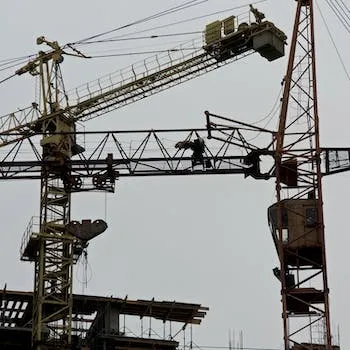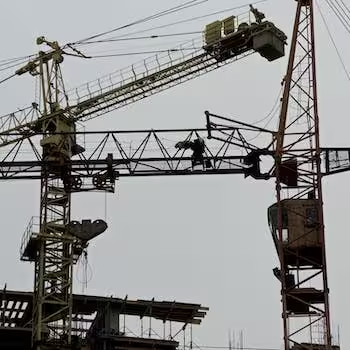-
Contents
“Unlock the Future of Industrial Machinery Maintenance with AI!”
The use of artificial intelligence (AI) is becoming increasingly prevalent in the industrial machinery industry. As a result, Industrial Machinery Mechanics are being affected by this technology in various ways. This article will explore how AI is impacting the job of an industrial machinery mechanic and what the implications are for the future of this profession. It will also discuss the potential benefits that AI can bring to the industry and how it can be used to improve safety and efficiency. Finally, it will look at how Industrial Machinery Mechanics can prepare for the changes that AI may bring to their profession.
Exploring the Impact of AI on Industrial Machinery Mechanics

The impact of artificial intelligence (AI) on Industrial Machinery Mechanics is an increasingly important topic in the modern world. As AI technology continues to develop, it is becoming more and more integrated into industrial machinery, and this has a direct effect on the role of the industrial machinery mechanic.
In the past, Industrial Machinery Mechanics were responsible for maintaining and repairing mechanical components of machines. This included tasks such as replacing worn parts, lubricating moving parts, and adjusting settings to ensure optimal performance. However, with the introduction of AI technology, many of these tasks are now being automated. This means that Industrial Machinery Mechanics must now focus on more complex tasks such as diagnosing problems with AI-enabled systems and troubleshooting software issues.
The introduction of AI technology has also changed the way that Industrial Machinery Mechanics interact with machines. Instead of manually adjusting settings and making repairs, they now use AI-enabled systems to diagnose problems and make adjustments. This shift in responsibility requires Industrial Machinery Mechanics to have a greater understanding of AI technology and how it works. They must also be able to interpret data from AI-enabled systems in order to make informed decisions about how to best maintain and repair machines.
Overall, the impact of AI on Industrial Machinery Mechanics is significant. It has changed the way they interact with machines and shifted their responsibilities towards more complex tasks. As AI technology continues to develop, it is likely that these changes will become even more pronounced, requiring Industrial Machinery Mechanics to stay up-to-date with the latest advancements in order to remain competitive in their field.
How AI is Changing the Role of Industrial Machinery Mechanics
The role of Industrial Machinery Mechanics is changing as artificial intelligence (AI) becomes more prevalent in the industrial sector. AI is being used to automate processes, reduce costs, and improve efficiency. As a result, Industrial Machinery Mechanics are now required to have a greater understanding of AI technology and its applications.
Industrial Machinery Mechanics are now responsible for maintaining and repairing machines that are powered by AI. This requires them to be familiar with the programming language used to control the machines, as well as the hardware components that make up the machine. They must also be able to troubleshoot any issues that arise with the machine’s AI system.
In addition, Industrial Machinery Mechanics must be able to interpret data generated by the machine’s AI system. This data can be used to identify potential problems and suggest solutions. Industrial Machinery Mechanics must also be able to use this data to optimize the performance of the machine.
Finally, Industrial Machinery Mechanics must be able to work with other professionals in order to ensure that the machine is functioning properly. This includes working with software engineers, data scientists, and other experts in order to ensure that the machine is running optimally.
As AI technology continues to evolve, so too will the role of Industrial Machinery Mechanics. They will need to stay up-to-date on the latest developments in AI technology in order to remain competitive in their field. With their knowledge and expertise, they will continue to play an important role in keeping industrial machines running smoothly and efficiently.
Examining the Challenges Faced by Industrial Machinery Mechanics in an AI-Driven World
Industrial Machinery Mechanics are facing a number of challenges in an increasingly AI-driven world. As automation and artificial intelligence become more prevalent, Industrial Machinery Mechanics must adapt to the changing landscape or risk becoming obsolete. This article will examine the challenges faced by Industrial Machinery Mechanics in an AI-driven world and discuss potential solutions.
One of the primary challenges faced by Industrial Machinery Mechanics is the need to stay up-to-date on the latest technology. As AI and automation become more advanced, Industrial Machinery Mechanics must be able to understand and work with these new technologies. This requires a significant investment of time and resources to stay abreast of the latest developments in the field. Additionally, Industrial Machinery Mechanics must be able to troubleshoot and repair complex systems that are powered by AI, which can be difficult for those who are not familiar with the technology.
Another challenge faced by Industrial Machinery Mechanics is the potential for job displacement due to automation. As AI-powered machines become more efficient and cost-effective, they may replace human workers in certain roles. This could lead to a decrease in demand for Industrial Machinery Mechanics, as well as a decrease in wages for those who remain employed in the field.
Finally, Industrial Machinery Mechanics must also contend with the ethical implications of working with AI-powered machines. As AI becomes more sophisticated, it raises questions about how these machines should be used and what rights they should have. Industrial Machinery Mechanics must consider these issues when working with AI-powered machines and ensure that they are being used responsibly.
Fortunately, there are a number of solutions that can help Industrial Machinery Mechanics address these challenges. First, they can invest in continuing education to stay up-to-date on the latest developments in their field. Additionally, they can look for opportunities to specialize in certain areas of AI or automation, which can help them remain competitive in an increasingly automated world. Finally, they can advocate for ethical standards when working with AI-powered machines to ensure that they are being used responsibly.
In conclusion, Industrial Machinery Mechanics face a number of challenges in an increasingly AI-driven world. However, by investing in continuing education, specializing in certain areas of AI or automation, and advocating for ethical standards when working with AI-powered machines, Industrial Machinery Mechanics can remain competitive and continue to make valuable contributions to their field.
Q&A
1. How is AI impacting Industrial Machinery Mechanics?
AI is being used to automate many of the tasks that Industrial Machinery Mechanics used to do manually. This includes predictive maintenance, diagnostics, and troubleshooting. AI can also be used to optimize production processes and reduce downtime.
2. What skills do Industrial Machinery Mechanics need to stay competitive in the face of AI?
Industrial Machinery Mechanics need to stay up-to-date on the latest technology and trends in the industry. They should also develop skills in data analysis, programming, and machine learning so they can better understand how AI works and how it can be applied to their work. Additionally, they should focus on developing soft skills such as communication, problem solving, and critical thinking.
3. What opportunities are available for Industrial Machinery Mechanics in the age of AI?
Industrial Machinery Mechanics can use AI to become more efficient and productive in their work. They can also use AI to develop new products or services that can help their business grow. Additionally, they can use AI to create new job roles such as data scientists or machine learning engineers that can help them stay competitive in the market.In conclusion, while AI is having an impact on Industrial Machinery Mechanics, it is not likely to replace them entirely. AI can help to automate certain tasks and make them more efficient, but the complexity of industrial machinery requires a human touch. Industrial Machinery Mechanics will still be needed to diagnose and repair complex problems, as well as provide maintenance and preventive care.
If you’re an Industrial Machinery Mechanic, it’s time to take action and learn more about how AI is impacting your industry. Don’t be left behind – click here to find out more about the impact of AI on Industrial Machinery Mechanics.


